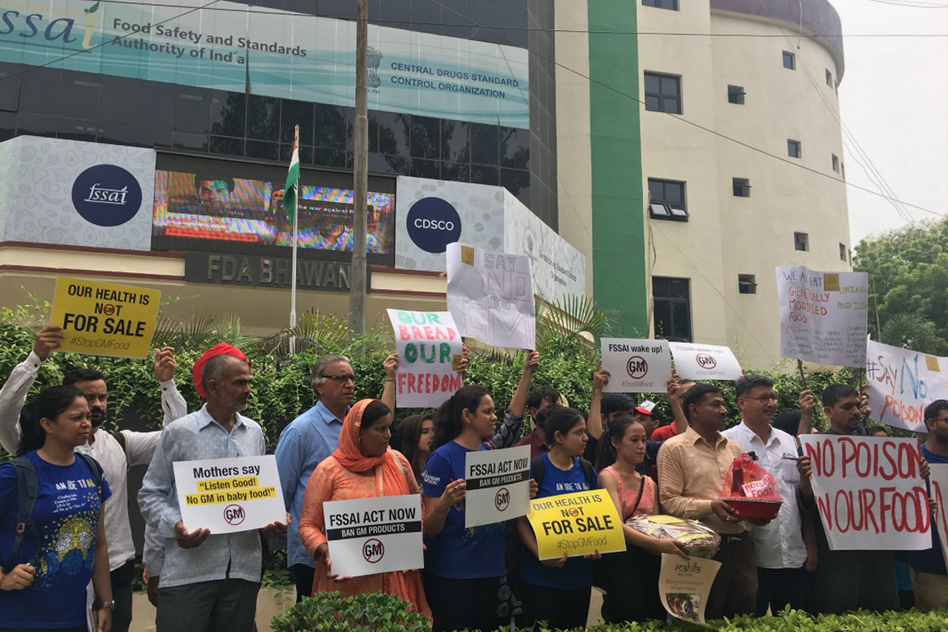
GM Content Present In Infant Food, Packaged Snacks; FSSAI Initiates Framing Regulations After Protest
10 Aug 2018 5:12 AM GMT
On August 7, a delegation of citizens representing India For Safe Food (IFSF) staged a protest outside food safety regulator board’s (FSSAI) office demanding the removal of illegal Genetically Modified food that is widely available in our markets. They demanded the immediate removal of GM; whose manufacturing and sale is already banned in India. Their response came after a study that was released last month that pointed out the presence of GM in infant food and packaged snacks available in markets.
Just after being accused of not taking action against GM, FSSAI initiated forming regulations that would “lay down procedures for safety assessment and approval of foods including imported foods, derived from genetic modification processes based on the internationally well established and accepted scientific principles, procedures and practices before being approved for food purposes.”
The CSE findings
On July 26, a study from Centre for Science and Environment (CSE) found out that Genetically Modified (GM) food is sold without any regulation from health and food regulators.
CSE’s Pollution Monitoring Laboratory (PML), which conducted this study, tested 65 food products available in the Indian market, of which 32% (almost 21 food products) had GM content present in it. The sample for the text included infant food and packaged snacks that came back GM positive; above the danger mark. These sample products were randomly purchased from retail outlets in Delhi-NCR, Punjab and Gujarat. In these samples, 35 products were imported, and the other 30 were domestically produced.
FSSAI refuses to take action
On meeting with the FSSAI CEO Pawan Kumar Agarwal, the protestors demanded an immediate removal of the said products from getting sold in the Indian market. FSSAI CEO said that the reports were from a private organisation and they will run their own tests. He also said that he will take their complaint into consideration and review the situation and form regulations against the sale of GMO. While the protesters asked what will happen in the meanwhile, he replied that there is no ‘scientific proof’ that GMO can impact human health.
Its completely unacceptable and I got scared (won't you?) When CEO of FSSAI says- what can be done? There are no…
Posted by Ajay Etikala on Tuesday, August 7, 2018
According to media reports, showing dissatisfaction over the FSSAI response on CSE’s report the delegation said, “The response of the FSSAI does not satisfy us. It is not enough that they say that they are in the process of formulating regulations concerning GM foods. They have said this for years now. What about the interim, when GM is being consumed by unaware citizens unknowingly, and when the industry is using loopholes to undertake unlawful sales?” asked delegations in a statement.
Further, the protesters met the CEO of Food Safety and Standards Authority of India (FSSAI), Pawan Agarwal, demanding action on the matter. However, dismissing the CSE report, Agarwal refuses to take action on the findings.
“When he said the findings were that of a private organisation, we requested him to test those samples in a government lab. However, he refused to do that, putting the onus upon us for producing evidence that GM food is not fit for human consumption. He ignored a large body of scientific work that suggests so,” told IFSF’s Ajay Etikala to DownToEarth.
The FSSAI authorities also told the protesters that they (officials) couldn’t act as there is no proper law. Meanwhile, the officials also mentioned that the government is in the process of forming a law.
“The FSSAI has clearly said in an affidavit submitted in the Supreme Court in May 2017 since regulation is yet to be framed, it follows that GM food is not permitted to be sold in the country. So, why can’t they act against producers/importers of those 21 products which CSE tested positive for GM,” said Jaya Iyer of KHANA, a consumer awareness group.
The FSSAI has also proposed that only those food which contains GM content more than five per cent by weight, will need to label and rest need not to do so.
Expressing concern over this, the protesters pointed out that the limit of 5 per cent was too relaxed, because in European Union the limit is 0.9 per cent and in Brazil, New Zealand and Australia it is up to 1 per cent.
Is GM harmful to us?
Genetically modified crops have their DNA modified using genetic engineering methods. The Genetically Modified food involves taking genes (DNA) from different organisms and inserting them in food crops. Researchers are concerned that this ‘foreign’ DNA may lead to risks such as toxicity, allergic reactions, and nutritional and unintended impact.
The World Health Organisation (WHO) IN 2003, and the Indian Council of Medical Research (ICMR) in 2008, in their guidelines emphasized on the toxicity, allergenicity and adverse nutritional effects as possible risks associated with GM food. FSSAI filed an affidavit in the Hon’ble Supreme Court saying that- “it follows that GM food is not permitted to be sold in the country” but these products are being openly sold without any prior checks.
Also Read: CSE Study Finds Genetically Modified Content Present In Infant Food, Packaged Snacks
 All section
All section













